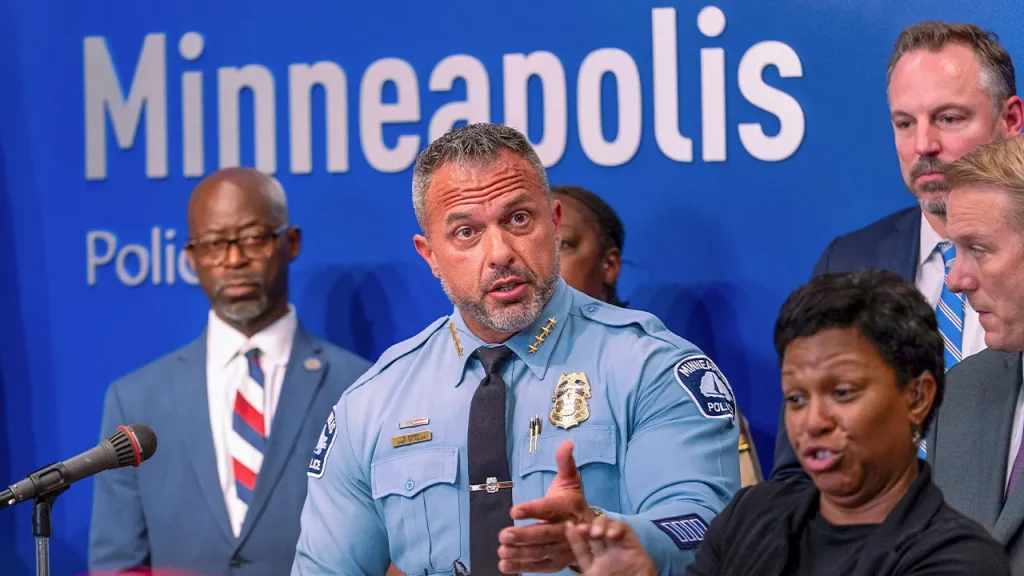Minneapolis Police Chief Apologizes to Somali Community Amid Controversy
In a heartfelt address at a Thursday news conference, Minneapolis Police Chief Brian O’Hara apologized to the local Somali community for comments he made that appeared to connect “East African kids” to criminal activity in the city. “The Somali community here in Minneapolis has been welcoming and has shown love towards me, and I appreciate it,” O’Hara stated, acknowledging the three years of collaborative work they’ve undertaken to address serious issues affecting the community. While emphasizing the need for honesty about real problems facing Minneapolis, he expressed regret for any harm caused by statements that may have been taken out of context, as his intention was never to cause pain or division.
The controversy stemmed from an interview O’Hara gave to WCCO earlier in the month while discussing a deadly Halloween shooting and juvenile crime in Minneapolis. During this conversation, he remarked that the young people committing crimes in the Dinkytown area weren’t “poor kids from Minneapolis” but rather youth from surrounding communities who take “mommy’s Mercedes-Benz to Dinkytown.” He specifically mentioned “groups of East African kids” coming from various surrounding communities. These comments sparked immediate backlash, leading to a Change.org petition demanding an apology, which argued that the East African community had “already been carrying the weight of unfair scrutiny for years” and that the chief’s remarks would only intensify that burden.
This local controversy emerges against a backdrop of heightened national attention on Minneapolis’s Somali community following a recent investigative report by Ryan Thorpe and Christopher F. Rufo of the Manhattan Institute. Their findings alleged that taxpayer dollars from Minnesota were being funneled to Al-Shabaab, an al Qaeda-linked terrorist organization in Somalia, through various financial schemes. A former official who worked with the Minneapolis Joint Terrorism Task Force was quoted saying, “Every scrap of economic activity… anywhere Somalis are concentrated, every cent that is sent back to Somalia benefits Al-Shabaab in some way.” This report has intensified scrutiny on the community and raised questions about financial transfers between Minnesota and Somalia.
In the wake of these allegations, President Donald Trump announced on Truth Social that he was terminating Temporary Protected Status (TPS) for Somalis in Minnesota “effective immediately.” His statement claimed that “Minnesota, under Governor Waltz, is a hub of fraudulent money laundering activity” and that “Somali gangs are terrorizing the people of that great State, and BILLIONS of dollars are missing.” Christopher Rufo, co-author of the report that sparked this reaction, described Trump’s announcement as “a great start” and called for reviewing “all asylum, refugee, and citizenship applications” and initiating “denaturalizations and mass deportations up to the furthest limits of the law.”
The situation has prompted political action from Minnesota’s Republican congressional representatives. House Majority Whip Tom Emmer, along with Representatives Pete Stauber, Michelle Fischbach, and Brad Finstad, sent a letter to U.S. Attorney Daniel Rosen demanding an investigation into the alleged financial schemes. Their letter referenced multiple fraud cases involving members of the Somali community, including the Feeding our Future fraud scheme and alleged fraud in various state assistance programs. “It is bad enough that these individuals are defrauding our state, taking services and funds away from children and the most vulnerable,” the letter stated, “but now there is a good reason to believe that Minnesota taxpayer dollars are going straight into terrorists’ hands.”
These developments highlight the complex intersection of law enforcement, community relations, immigration policy, and national security concerns in Minneapolis. Chief O’Hara’s apology represents an attempt to maintain trust with the Somali community amid escalating tensions and scrutiny. Meanwhile, the allegations of financial links to terrorism and subsequent political responses underscore the broader national debate about immigration, security, and community integration. As these stories continue to unfold, they reveal the challenges of building inclusive communities while addressing legitimate concerns about crime and security – a balance that Minneapolis, like many American cities, continues to navigate in an increasingly polarized political environment.


